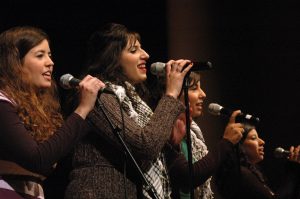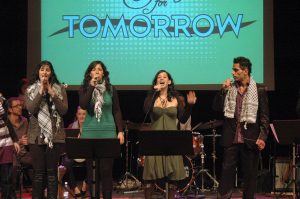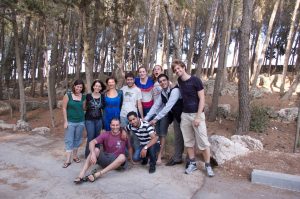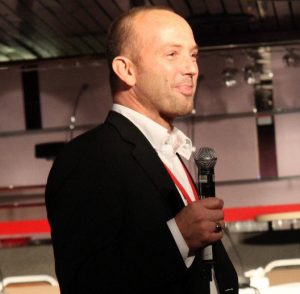Spiritus Mundi – Music on Troubled Grounds
Henrik Melius, Sweden
About Spiritus Mundi: Spiritus Mundi, an international organisation founded in Sweden in 2003 by musician and entrepreneur Henrik Melius, created 45 projects in 20 countries between 2003 and 2017. The projects were based on cultural exchanges, music, artistic expression and education; supporting children, youth and adults in the transfer of knowledge about each other’s way of life, music and traditions.
Many of our projects were ground-breaking. When you try something new that hasn’t quite been done before, it can be like walking on virgin ground. Or on thin ice.
When I think about our work with young musicians from Israel, Palestine, Sweden, Norway, Denmark and South Africa, in our 6-year platform Music on Troubled Grounds, I marvel at how it all was possible.
We created Music on Troubled Grounds originally as a platform for musicians in the Holy Land, young Israelis and Palestinians, to learn how to play and compose music together. But not only to simply be on stage together. What we aimed for was to give them a serious chance to talk, to start “the impossible” dialogue, to really get to know one another. The music was the link, a shared component that would hopefully facilitate a practical experience of togetherness among parties that have been taught to live in fear of each other. Music can help make that change in any part of the world.
We didn’t aim for the planned concerts just to be “for show”: we hoped the participants would take a leap of faith and see if they could build lasting friendships, love. This required time; years, in fact. It also meant that each project needed to include a number of activities that weren’t “only” rehearsing and composing music. We wanted everyone to feel safe sharing experiences of war, fear and occupation. This was not an easy task. It required conflict resolution workshops and lots of carefree activities like cooking together.
We needed to carefully staff the project with interested musicians and competent facilitators from both sides. Being Scandinavians, we represented the neutral ingredient. We invited Swedish, Norwegian and Danish musicians to participate.
After meeting my long-time friend, musician Avishai Yaar, in Jerusalem at a global music conference he produced for the International Music Council, I was inspired to explore how such a project could become reality. He encouraged me to put my dream into action.
Music on Troubled Grounds came to include a number of activities for the participants from 2009 to 2013. They worked, lived and performed together in Sweden, Estonia, the Holy Land and, finally, rural South Africa. Concerts were planned at the end of each project in each country. After hard work (including overcoming fear, diligent rehearsals, challenging discussions and tears, but mostly, I would say, joy) their joint efforts were presented on stage.

The stories of MOTG are many. For this article I have focused on sharing some memories from the concerts in Sweden, Estonia and South Africa.
It was nerve-racking to introduce the unlikely orchestra to the city of Malmö. The quality of the music was magnificent. The arrangements and performance were of a very high standard. But it was much more than that.
Early in the project’s first days, I had asked if the 13 young musicians would consider a moderated discussion before the concert, a personal presentation of their journey for the Swedish audience. They had their own process of deciding whether or not to do that. They said it would need to be a decision from a unanimous jury. They didn’t make up their minds until the day before the concert. They agreed on what they wanted to talk about, and who would do it. The four who were chosen would represent and speak for the others.
It was a courageous discussion. They spoke with unprotected hearts and with consideration for each other. I was overwhelmed. Proud.
They performed Jewish and Arabic songs. The music seemed to flow from the same source. Senior citizens in the audience left their crutches and got up to dance.
Critical people from different denominations had, prior to the event, informed me that they would indeed attend the concert. Their intentions were to make sure that criticism of Spiritus Mundi and the project was justified. After the show they approached me. They looked surprised when the words that came out of their mouths weren’t the ones they had planned. Instead of accusations like anti-Semitism or normalisation of occupation, they expressed something closer to appreciation.

Something happened as a result of the young Israeli, Palestinian and Scandinavian musicians’ performance, something difficult to describe in words. A force of a kind was brought to life: only for a few moments, yet with compelling effect. The force was not of a religious nature. Rather, it came from a different place, before religion of any kind. It seemed to reveal a place that we had never left, just simply forgotten we all belong to.
John Lennon would have been happy to know that his words WAR IS OVER – IF YOU WANT IT ring true.
Israeli participant Nimrod suggested that the recording of the concert ought to be played at every Israeli checkpoint. Israeli facilitator Danny looked at him in astonishment and said, “How do you think Palestinians abused by our military police would feel about that?”
The journey with Music on Troubled Grounds continued, in a new suit, to a different country.
This time I introduced them to an international audience in Estonia. The dream of the Holy Land continued. I stepped up on stage in front of a well-rehearsed, unlikely orchestra, with the sound of a trumpet added to the musical arrangements.
I knew it would be difficult for me to again find the words to describe the programme. It was never “just” a show. The hard work of making the concerts possible included personal transformation by many of the participants. I couldn’t begin to explain all the details of how they had made that possible.
I began by describing my grandpa’s fascination for the Holy Land. A quote from artist Youssou N’Dour about how music changes the world seemed appropriate. I linked his words about Music and Social Change to a more intimate perspective. From fear to love. From what is unreal to that which can only be real. A few words on how reconciliation transforms.
I concluded with an appeal to the audience:
If I can ask you to imagine the journey this unlikely orchestra is on. If you would for a moment close your eyes and look for a place within yourselves where everything is possible. A place where forgiveness may not even be necessary, because there never was condemnation.
Please, let me introduce: Dalia on trumpet, Mai on vocals, Mohammed and Khaldoun on vocals and darbouka, Nir on guitar, Petter on piano, Dror on guitar, Anne-Marte on bass guitar, Tal on vocals…

A year later we were all together again, in a new suit, in a different country. South Africa.
The concert was to begin at 6:00 pm.
Singer Manar was waving her Palestinian flag.
Stav had dressed in tribal South African clothes. South African participant Rhoda danced through every number.
Palestinian rapper Samm was wearing sunglasses and gangsta clothes.
Scandinavians Petter and Anne-Marte stood proudly on Mama Africa’s ground. They were together again with the unlikely orchestra for the third public concert.
Danish drummer Matias looked like he had turned into Animal from the Muppets.
Nir from Tel Aviv struggled to hear his guitar in the monitor.
It was wonderful chaos. I thought again of John Lennon and how the boys must have felt at Shea Stadium in New York.
Seshego was different. The chorus of colours on stage spoke a new language. They were moving in unison with the crowd. In fact, they had become an integral part of the crowd.
When music touches infinity, it doesn’t matter who is on stage and who is in the audience.
As with many projects Spiritus Mundi undertook, we faced challenges. We tackled disapproval, obstruction and journalistic activism. There were those who questioned my sanity for initiating projects like MOTG.
A talking head from Swedish national television expressed the following thoughts to me privately:
Why the hell are you going into war zones? Who do you think you are? Nothing you do will make a difference!
One of our South African facilitators, Zola, said recently:
The content of the project was incredible. Books should be written about it. You pulled off something unimaginable.
Words I am reminded of, thinking back on the MOTG years, are:
Yes, it is easier for a camel to enter through the eye of a needle than for a rich man to enter the kingdom of God.
I often get questions like:
What happened next? How did you measure the impact of the projects?
Do you think it has done any good? I don’t see peace!
The benefits, I believe, were everyone’s personal experiences: the musicians’, educators’, facilitators’, colleagues’ and my own. Stories pop up still, years later, about new little encounters that happen as a result of MOTG. I would argue that it has inspired almost everyone who contributed to the journey.
Recently I heard about the continuing journey of Israeli participant Stav and Palestinian participant Manar. It takes a lot for them to cope with the conditions they live under, especially Manar. They sometimes meet and sing together, despite it being considered impossible. Some would call it a fraction of an unsolvable puzzle. I disagree.
Reconciliation is timeless, no matter how small. It is more powerful than war and horrific memories of the Holocaust. What else can transform evil but love and atonement?
I see the terrible situation my Palestinian friends live under. I deeply support them in their desire to live and move freely in their homeland. They call it apartheid and I can understand why.
I also see the necessary journey of Avishai’s family to safety and peace.
The stories about the South African truth and reconciliation process gave all other participants essential perspectives.
The dream can change. Holocaust survivor Eva Mozes Kor showed how. She chose to forgive: a path to harmony beyond evil. She freed herself from forever darkness. The second she did, the dream was transformed. Her journey revealed that the holiest place, where an old hatred becomes a living memory of unlimited love, is within reach. The Forgiven World is real…
Music on Troubled Grounds was born in Jerusalem and for us concluded in rural South Africa. A wise parent will leave their baby to learn how to walk on her own. The participants did the work. They were the makers of change. Music can help facilitate this in every corner of the world, wherever change is needed.
 Henrik Melius has seen leadership, intercultural communication and social entrepreneurship defined numerous ways over the years. Are they charisma and positive thinking? Decisiveness? Is it all about the situation? Are they meant only for the chosen few or is there a different story? Or are they possibly all of the above? With more than two decades of real-life, in-the-trenches innovation in cultural communication, social entrepreneurship, music and education, sales and project management, his view is radically different. Henrik knows that leadership for intercultural communication sales and trade is a moment-to-moment choice and is not about title, education or position. Leadership is for everyone, every day. Henrik – a Swede by birth – is respected for his ability to create, manage and complete challenging intercultural programs. He brings out the best in people, and is known for his practical and diplomatic skills and his empathetic style. He has served on the executive board of UNESCO’s International Music Council. He is a musician by trade: he served the music industry for many years in Los Angeles, including management and promotion for major record labels. He composed a hit song for US radio and produced several musical and theatrical events internationally. Email: henrik@spiritusmundi.nu
Henrik Melius has seen leadership, intercultural communication and social entrepreneurship defined numerous ways over the years. Are they charisma and positive thinking? Decisiveness? Is it all about the situation? Are they meant only for the chosen few or is there a different story? Or are they possibly all of the above? With more than two decades of real-life, in-the-trenches innovation in cultural communication, social entrepreneurship, music and education, sales and project management, his view is radically different. Henrik knows that leadership for intercultural communication sales and trade is a moment-to-moment choice and is not about title, education or position. Leadership is for everyone, every day. Henrik – a Swede by birth – is respected for his ability to create, manage and complete challenging intercultural programs. He brings out the best in people, and is known for his practical and diplomatic skills and his empathetic style. He has served on the executive board of UNESCO’s International Music Council. He is a musician by trade: he served the music industry for many years in Los Angeles, including management and promotion for major record labels. He composed a hit song for US radio and produced several musical and theatrical events internationally. Email: henrik@spiritusmundi.nu
Edited by Karen Bradberry, Australia